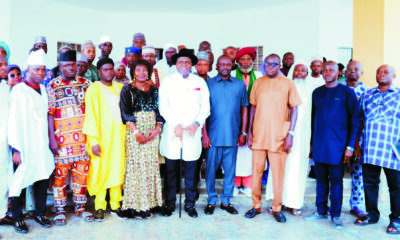Oil & Energy
Oil Theft, Hindrance To National Economy -Dickson
Bayelsa State Governor, Hon. Seriake Dickson says the activities of oil thieves pose a great threat not only to the economy but also to national security.
Governor Dickson stated this when he received the new Flag Officer Commanding, Central Naval Command, Yenagoa, Rear Admiral Sidi-Ali Usman in Government House, Yenagoa.
Expressing concern over the rate of illegal OIL bunkering, sea piracy and pipeline vandalisATION. The governor linked the proliferation of small and light weapons to such activities in the littoral states.
According to Governor Dickson, the criminals have been able to sustain their operations over the years through the proceeds from illegal bunkering activities.
In his words: “What is going on is more of a threat to national security than even the loss of revenue that everybody is shouting about. Let me tell you that all the violence, brigandage and criminality that we experience in the Niger Delta states particularly Bayelsa where I know more, have their roots in the activities in the creeks.
“It is from there they have easy funds to recruit followers; it is from crude oil theft and illegal refining that people are able to sustain such large numbers of youths and put them into various cult groups.
“What is going on has a direct effect on the proliferation of small and light weapons because they need an army of youths to protect their territories to be able to withstand the onslaught of legitimate security personnel.
The Governor warned those who have rebuffed the olive branch extended to cultists by the state government to have a change of heart, as his administration would not hesitate to bring them to justice.
“For those who have defied the Cultism Proscription law, in spite of the olive branch we have put forward and arrangement for their renunciation and eventual integration but still want to go ahead with cult activities, I am sounding a clear note of warning that this government will not succumb to blackmail or propaganda. This government will work with security agencies in this state to ensure that those who violate the laws of this state and country will be brought to book.”
Consequently, he called for maximum cooperation from the security operatives especially the Nigerian Navy to achieve the present administration’s policy of zero tolerance to violence and crime.
Describing the establishment of the Central Naval Command in the state as significant, Governor Dickson said considering the maritime nature of the state, the Navy has a crucial role to play in policing its waterways.
While commending the out gone Flag Officer Commanding, Rear Admiral Olutoyin Johnson for serving the state creditably, he assured the new FOC of government’s continued support.
Commenting on his posting to the Command, the Flag Officer Commanding, Central Naval Command, Rear Admiral Sidi-Ali Usman, said he assumed duties about 3 weeks ago and has already gone on a familiarization tour of the formations under his command.
Rear Admiral Usman expressed determination to combat oil theft and other criminal activities in line with federal government’s mandate.
Oil & Energy
FG Explains Sulphur Content Review In Diesel Production
The Federal Government has offered explanation with regard to recent changes to fuel sulphur content standards for diesel.
The Government said the change was part of a regional harmonisation effort, not a relaxation of regulations for local refineries.
The Chief Executive, Nigerian Midstream and Downstream Petroleum Regulatory Authority (NMDPRA), Farouk Ahmed, told newsmen that the move was only adhering to a 2020 decision by the Economic Community of West African States (ECOWAS) which mandated a gradual shift to cleaner fuels across the region.
Ahmed said the new limits comply with the decision by ECOWAS that mandated stricter fuel specifications, with enforcement starting in January 2021 for non-ECOWAS imports and January 2025 for ECOWAS refineries.
“We are merely implementing the ECOWAS decision adopted in 2020. So, a local refinery with a 650 ppm sulphur in its product is permissible and safe under the ECOWAS rule until January next year where a uniform standard would apply to both the locally refined and imported products outside West Africa”, Ahmed said.
He said importers were notified of the progressive reduction in allowable sulphur content, reaching 200 ppm this month from 300 ppm in February, well before the giant Dangote refinery began supplying diesel.
Recall that an S&P Global report, last week, noted a significant shift in the West African fuel market after Nigeria altered its maximum diesel sulphur content from 200 parts per million (ppm) to around 650 ppm, sparking concerns it might be lowering its standards to accommodate domestically produced diesel which exceeds the 200 ppm cap.
High sulphur content in fuels can damage engines and contribute to air pollution. Nevertheless, the ECOWAS rule currently allows locally produced fuel to have a higher sulphur content until January 2025.
At that point, a uniform standard of below 5 ppm will apply to both domestic refining and imports from outside West Africa.
Importers were previously permitted to bring in diesel with a sulphur content between 1,500 ppm and 3,000 ppm.
It would be noted that the shift to cleaner fuels aligns with global environmental efforts and ensures a level playing field for regional refiners.
Oil & Energy
PHED Implements April 2024 Supplementary Order To MYTO
The Port Harcourt Electricity Distribution (PHED) plc says it has commenced implementation of the April 2024 Supplementary Order to the MYTO in its franchise area while assuring customers of improved service delivery.
The Supplementary order, which took effect on April 3, 2024, emphasizes provisions of the MYTO applicable to customers on the Band A segment taking into consideration other favorable obligations by the service provider to Band A customers.
The Head, Corporate Communications of the company, Olubukola Ilvebare, revealed that under the new tariff regime, customers on Band A Feeders who typically receive a minimum supply of power for 20hours per day, would now be obliged to pay N225/kwh.
“According to the Order, this new tariff is modeled to cushion the effects of recent shifts in key economic indices such as inflation rates, foreign exchange rates, gas prices, as well as enable improved delivery of other responsibilities across the value chain which impact operational efficiencies and ability to reliably supply power to esteemed customers.
“PHED assures Band A customers of full compliance with the objectives of the new tariff order”, he stated.
Ilvebare also said the management team was committed to delivering of optimal and quality services in this cost reflective dispensation.
The PHED further informed its esteemed customers on the other service Bands of B, C D & E, that their tariff remains unchanged, adding that the recently implemented supplementary order was only APPLICABLE to customers on Band A Feeders.
Oil & Energy
PH Refinery: NNPCL Signs Agreement For 100,000bpd-Capacity Facility Construction

The Nigerian National Petroleum Company Ltd (NNPCL) has announced the signing of an agreement with African Refinery for a share subscription agreement with Port-Harcourt Refinery.
The agreement would see the co-location of a 100,000bpd refinery within the Port-Harcourt Refinery complex.
This was disclosed in a press statement on the company’s official X handle detailing the nitty-gritty of the deal.
According to the NNPCL, the new refinery, when operational, would produce PMS, AGO, ATK, LPG for both the local and international markets.
It stated, “NNPC Limited’s moves to boost local refining capacity witnessed a boost today with the signing of share subscription agreement between NNPC Limited and African Refinery Port Harcourt Limited for the co-location of a 100,000bpd capacity refinery within the PHRC complex.
“The signing of the agreement is a significant step towards setting in motion the process of building a new refinery which, when fully operational, will supply PMS, AGO, ATK, LPG, and other petroleum products to the local and international markets and provide employment opportunities for Nigerians.
By: Lady Godknows Ogbulu
-
Business4 days ago
Boat Mishap: CILT Advocates Safety Culture On Waterways …Claims 300 Nigerians In 2023
-

 Niger Delta4 days ago
Niger Delta4 days agoNCDMB Boss Lauds SNEPCO, Others Over Project Execution
-

 Business4 days ago
Business4 days agoAFEX Launches Impact Report On Food Security
-
Oil & Energy4 days ago
FG Explains Sulphur Content Review In Diesel Production
-

 News4 days ago
News4 days agoNGF Advocates Safer Transportation Of Petroleum Products
-

 Maritime4 days ago
Maritime4 days agoDrydock To Complete LAGFERRY Maintenance, Aug -Commissioner
-
Business4 days ago
LASG Makes Over N500m From Traffic Offences
-

 Education4 days ago
Education4 days agoVC Demands Improved Power Supply For University

